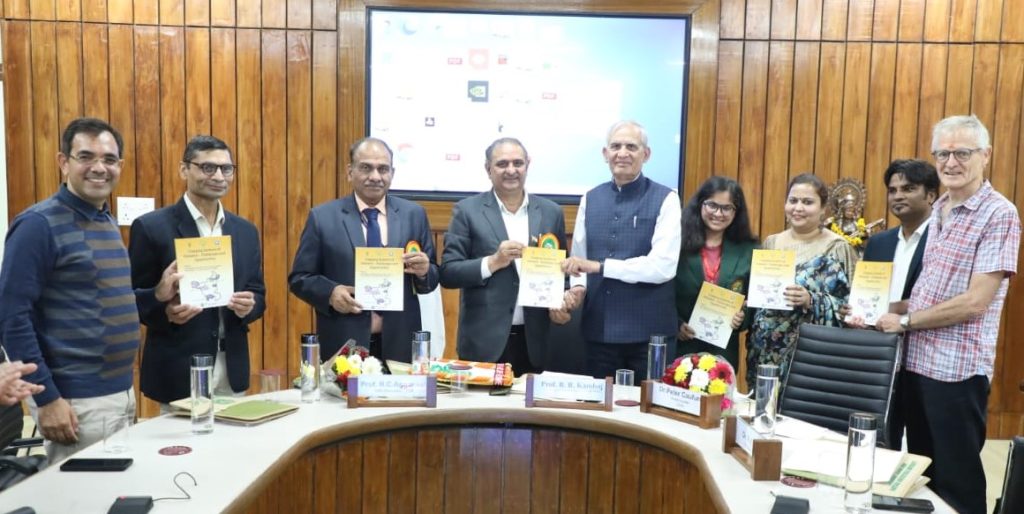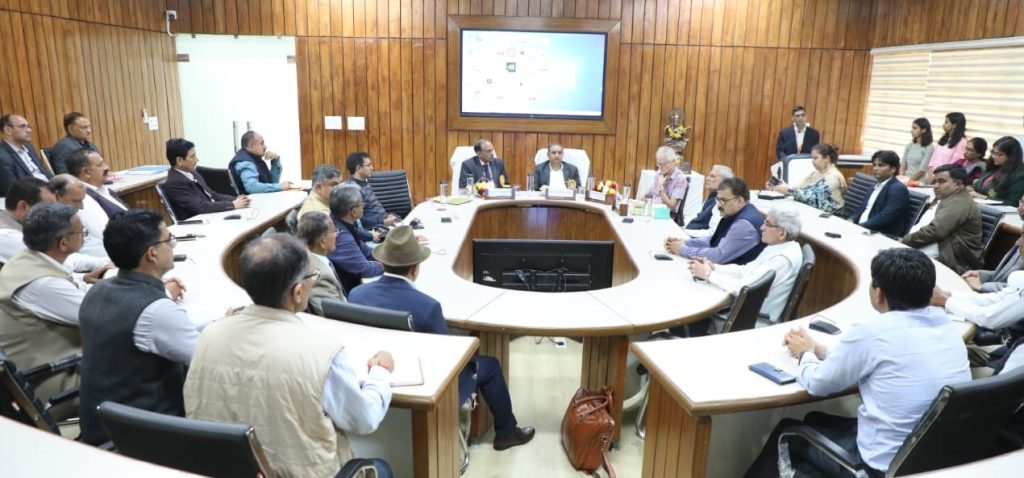Cropping systems of Haryana – Challenges and Opportunities
CSISA publication under the RAWE program of CCSHAU released in February 2023

Cereal Systems Initiative for South Asia (CSISA) project, in collaboration with Chaudhary Charan Singh Haryana Agricultural University (CCSHAU), initiated a capacity development program under the university’s Rural Agricultural Work Experience (RAWE) for students graduating with an honours Bachelor in Science in agriculture. Under this collaboration, students would collect data on agricultural practices used by farmers following CSISA’s landscape diagnostic survey (LDS) framework. CSISA supported the staff with technical guidance, including training-of-trainers (TOT) — faculties from the Department of Agronomy, Agricultural Economics, and Agricultural Extension at CCSHAU. Following this, students underwent training led by the trained faculty and supervised by the CSISA team.
The twin objectives of this collaborative initiative were to gain an understanding of the existing challenges and opportunities for these cropping systems in Haryana through a bottom-up approach and to prepare students for careers in agriculture by building their practical skills for digital agriculture and big data management.
Online fitness, physical fitness can be bought online – www.stile.it dianobol gymnica – the fitness portal. training, training, bodybuilding, nutrition, supplements, sports, diet, weight lossFrom 18 Sept. – 18 December 2022, 210 students under RAWE collected data through LDS on three cropping systems (through a questionnaire designed by the faculty with CSISA and uploaded through ODK Collect). The three cropping systems were Rice-Wheat (RWCS), Pearl Millet-Mustard (PMCS), and Cotton-Wheat (CWCS) in seven districts of Haryana — Sirsa & Hisar for CWCS, Rewari & Mahendergarh for PMCS, and Panipat, Kurukshetra, and Yamunanagar for RWCS.
Post the survey, the data collected was analyzed, and an overview of overall production, current practices, and the significance of this evidence generated was published in a book titled ‘Cropping Systems of Haryana – Challenges and Opportunities”, The book documents the success of both these objectives to a large extent.
On 20 February 2023, a session to felicitate students and faculty for their contribution was organized at the CCSHAU. The book was released at this session. The DDG Education Dr. R.C Aggarwal attended the event with the Vice Chancellor of CCSHAU, Prof. B.R Kamboj and Dean College of Agriculture, Dr. S.K Pahuja. CSISA was represented by Dr. Peter Craufurd (CIMMYT), Dr. RK Malik (CIMMYT), and Dr. Virender Kumar (IRRI) with other project colleagues.
In his opening remarks, Dr. Malik emphasized the importance of evidence generation, which is the key to developing interventions, improving policies, or new technology recommendations. He argued that through RAWE, data collection for evidence generation could be made easy, unbiased, accurate, and directly from the farmers. He expressed, “based on this evidence generated through the RAWE survey, the scientific community can come together, discuss and argue and develop consensus for future decision-making.” Dr. Craufurd highlighted the necessity for big data and establishing the convergence platform (CP) where all stakeholders – SAUs, ICAR-KVKs, private sector partners, the State Department of Agriculture, and line departments – can interact and try to overcome the existing gaps. He said the RAWE pilot contributes to monitoring, evaluation, and learning at the state level, enhancing the students’ and associated members’ capacity and skills.

Three students from the RAWE program Muskan, Nilanchal Nishan, and Aman Kumar presented their results from RWCS, CWCS and PMCS, respectively. The students also shared their experiences from the field and how the exposure has helped them understand farmers and their practices better. Dr. Kumar presenting an overview of the data results from the three cropping systems, declared that if the RAWE pilot at CCSHAU becomes part of all the 74 existing SAUs in the country, then many important data points can be collected for evidence generation. He observed that several findings that have emerged through the survey need further understanding and strategies for dealing with some of it.” Dr. Arindam Samaddar from CSISA briefly mentioned the process involved in this survey toward data collection and the sampling method, i.e., how the districts, villages, and households were selected.
Prof. Kamboj, in his address, apprised participants of the significance of this pilot RAWE program and how the students can take these real learnings and challenges of the survey with them further. He felt the real-time data generated through the unbiased nature of enumerators (students) would help to convince the policymakers, extension agents, and farmers about appropriate actions/recommendations resulting from the survey. Convinced of the importance of this program, Dr. Aggarwal, in his closing remark, said that this RAWE pilot by CCSHAU must be discussed and implemented across India through the universities. He further requested Dr. Kamboj to present these findings (data) at the ‘Conference of Vice-Chancellors of Agricultural Universities’ to be organized by ICAR in March this year. Dr. Agarwal also expressed the need for basic knowledge and understanding of Artificial Intelligence (AI) in the agriculture science curriculum to prepare students better.
